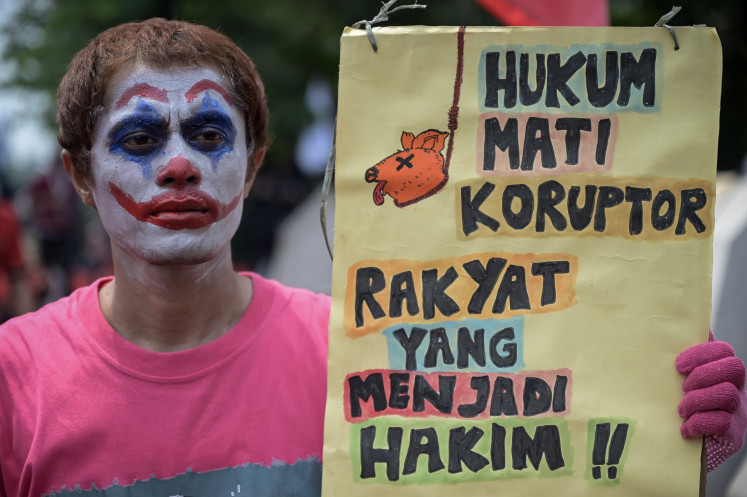Popular Reads
Top Results
Can't find what you're looking for?
View all search resultsPopular Reads
Top Results
Can't find what you're looking for?
View all search resultsUphill battle to quit smoking
Smoke-free future: Two smokers participate in a therapy session to help them quit smoking during an event to mark World No Tobacco Day on Jl
Change text size
Gift Premium Articles
to Anyone
S
span class="caption">Smoke-free future: Two smokers participate in a therapy session to help them quit smoking during an event to mark World No Tobacco Day on Jl. Ir. H. Djuanda in Bandung on Sunday.(JP/Arya Dipa)
Amid the government's efforts to discourage smoking, Indonesia has seen it is so common among citizens that it may potentially burden the country's universal health care program.
Research from the Health Ministry's research and development agency (Balitbangkes) this year found that there are a total of 58.75 million active smokers aged 10 years or above, or about one-fourth of the country's population.
'The total number consists of 56.86 million men and 1.89 million women,' said agency head Tjandra Yoga Aditama as quoted by Antara news agency.
The research also found an increasing prevalence of smoking among women from 1.7 percent in 1995 to 2.3 percent in 2013. For men, the rate increased to 66 percent in 2013 from 53.4 percent in 1995.
The government has implemented several approaches to persuade smokers to quit, including putting horribly graphic pictures on cigarette packs showing the affects of smoking and limiting cigarette advertisements on television.
The ministry recently launched a new video displaying the dangers of smoking for health and for families exposed to cigarette smoke. The video is being broadcast on several private Indonesian television stations.
'It is just a picture. I am not influenced by the pictures. Even if I am, I can easily tear out the pictures and solve the problem,' said Wiryo, a 49-year-old ojek driver in Pinang Ranti, East Jakarta, about the photos on the cigarette packs.
'I don't see [the policy as] effective. I am not affected. My friends also say they are not affected.'
Other research from the ministry in 2013 found that on average men consumed 10.5 cigarettes a day and women 5.4.
Public health expert Hasbullah Thabrany from the University of Indonesia (UI) said that the rising number of smokers was alarming.
Those who keep their smoking habit will increase health costs that the National Health Insurance (JKN) will have to cover in the future.
'The negative effect of smoking is normally felt after 20 years of smoking. Imagine how much money the government needs to spend out of the JKN to hospitalize these people,' Hasbullah said, citing cardiovascular diseases and tumors as examples.
A study from UI's Center for Health Economics and Policy Studies (CHEPS) found that it is more effective to reduce cigarette consumption by raising taxes than by putting scary pictures on the cigarette packs.
'Higher cigarette tax will increase cigarette prices. Thus, low-income smoking families will stop smoking, or at least reduce their smoking habit,' Hasbullah said.
He also recommended that cigarette duties should contribute to the JKN program to help cover the costs incurred by the diseases.
Rolled out in 2014, the program, under the management of the Health and Social Security Agency (BPJS Kesehatan), has reported a deficit between the claims it has paid and the premiums it has received. The deficit stood at Rp 1.54 trillion, with Rp 42.6 trillion paid out in claims and Rp 41.06 trillion received in premium payments.
BPJS Kesehatan expects to remain in the red throughout this year, with its claim ratio predicted to hover around 100 percent. The claim ratio is the difference between the hospitals' bills for health services provided and the premiums collected by the agency from participants registered in the program.
Despite the program's financial woes, Hasbullah said that it would be impossible to exclude those with smoking-related diseases from the JKN.
'Most of the smokers come from low-income families because they tend to work outside prohibited areas all the time,' he said.
According to a survey by the Indonesia Forum on Parliamentarians for Population and Development (IFPPD) in 2009, 63 percent of breadwinners in the 19 million low-income families in Indonesia are smokers. (saf)










